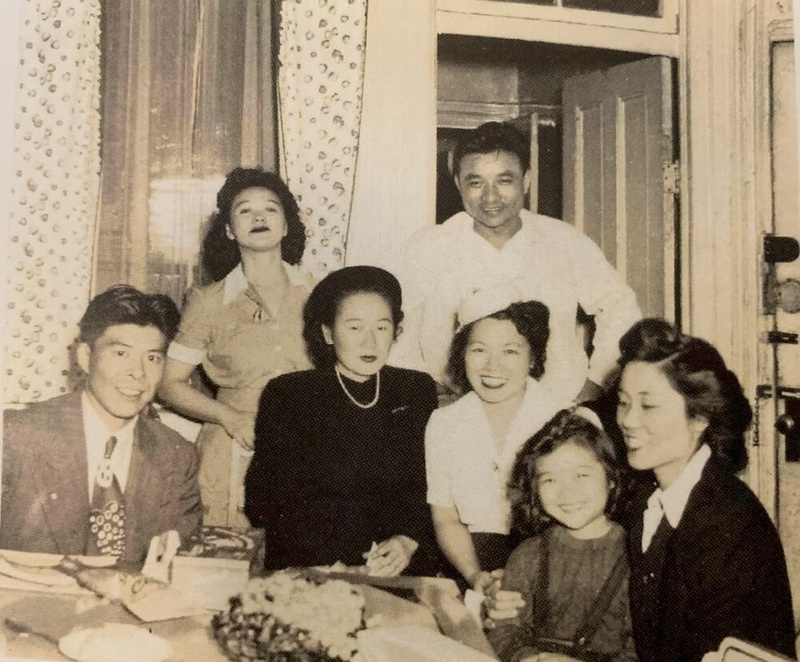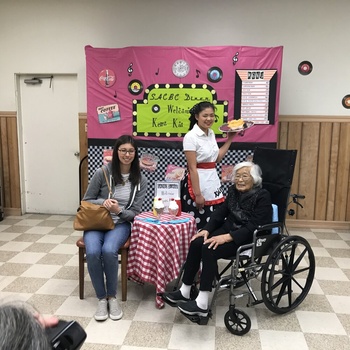Can you talk about meeting your husband? Did you meet him in Cleveland?
Shizuko Yamauchi (SY): No. He was in the service.
Nancy Dodd (ND): He was in the 442.
SY: Well we had a boarding house, so if they had any leave they would come and stay overnight and go back to the—wherever. So that’s how he came to—
So you knew him from San Luis Obispo. Were you corresponding all throughout the war?
SY: Yes, but he was Kibei. So I always guessed that he had somebody write for him but I never asked him.
ND: He was born in Penryn, Loomis. His parents went back to Japan and he came back as a young man on the boat and got a job farming. Then the war came and he was drafted.
How old was your husband [Masao] when he went into the service?
SY: All I know is we were the same age.
So he was in Europe during the war?
SY: Yeah.
Did he ever talk about his experience and what he went through?
SY: I know that he was in France.
But he survived it, he came home.
SY: Oh yeah.
Where did you meet him again?
SY: Well he came to where I lived because he had no family. He was Kibei, his family was all in Japan so he just showed up one day. Yeah, where I lived, ‘cause he had no family.
Did that surprise you? Did you know he was coming back?
SY: Well no. One day there he was.
Were you happy to see him?
SY: Well yeah! More surprised though. I don’t think there was any engagement period. There was a Buddhist minister right in camp so yeah, I remember, he came and I don’t remember any ring or anything.
ND: And her best friend stood up for them—Mitzi Yokoyama.
SY: My mother made friends with our neighbor, the neighbors were hakujin. I really marveled ‘cause my mother didn’t speak good English but she spoke broken English, became friends with the hakujin neighbors. She was very outgoing, so we became good friends.
What happened to your stepfather? Did he pass away?
ND: Yeah, he passed away in camp. I never knew my grandfather, or step-grandfather. When mom was pregnant with me, my grandma came to live with us ‘til I was three years old. So I spoke nothing but Japanese. So off and on, my grandmother would live with her older sister Toshi in Los Angeles.
Your mom sounded like she was a pretty independent lady.
SY: Oh yes, oh yes. She said when she left Japan she had a choice—do you want to go to Hawai’i or America? And she said, “If I’m gonna go far away I want to go far far away.” So she came to America, not Hawai’i. She had a lot of spunk [laughs].
And when she came to California did she get off in San Francisco? Or how did she end up in San Luis Obispo?
SY: I wonder. I know they all embarked in San Francisco. I don’t know.
To Nancy: So you were raised in Cleveland?
ND: Yes I was born and raised in Cleveland.
SY: Church was just the gathering place for all of us. That’s where we went on Sundays.
How many children did you have?
SY: Just Nancy.
How long did you live in Cleveland?
SY: Until, I don’t know. Until we came here, huh?
ND: My dad was a glazier, he installed mirrors, he cut mirrors in residences, glass. And Cleveland weather — in the wintertime, tornadoes and snow and blizzards and all this stuff. And I went two years at the University of Cincinnati and I came home and Dad said, “Find a college in California to transfer because we want to move back.” So I chose Sacramento State and I graduated in ‘69 and in ‘71 they moved to Newark. It was his occupation. Also the fact that their company that they worked for was not union and he would install huge storefront windows. The next day some guys would throw acid on the window because they were not union so it kind of, you know.
So he got tired of that. And he did the same job when he got to California?
ND: Yeah, they were here a week or so and right away Dad got a job. So they were living in an apartment so Dad said, “Find a house, find a house.” And he and a partner went into partnership in Niles, Fremont area. So he had that — ask my mother how long he had the glass shop.
How long did your husband own the glass shop?
SY: Until we — I don’t know. Ten years or more, I think. But I don’t remember how long.
ND: She took care of the office. She and his partner’s wife took turns in the office.
What was the name of the store?
ND: The Glass Shoppe.
Did he start that business himself or did he take it over from somebody?
SY: Bob was there already and so my husband became a partner. Yeah.
Were you happy to come back to California?
SY: Oh yeah, oh yes. California was home to me.
And where was your mother living?
ND: She was living with Auntie Kay. She lived most of the time with my mom’s oldest sister, Toshii. In L.A.
SY: That’s right.
When you received the redress and apology letter in the late ‘80s, what was your feeling when you received the redress?
SY: I don’t remember. We did get an apology, huh? Eh, it didn’t mean much I guess. I remember getting something but evidently it didn’t mean much to me because I don’t remember.
By then did you just feel that time in your life was over?
SY: Yeah, that’s gone. No point in griping, getting mad about that, you know.
To Nancy: Do you remember what your feelings were when your parents received redress?
ND: I think I was glad because they suffered a lot. They suffered a lot.
Did you ever feel that it interrupted your life in any way?
SY: Oh yes that’s something that happened to me, and so what? Yeah it’s like anything else that’s upsetting, there’s no point keeping it in your head and getting upset about it. So shrug and forget about it.
To Nancy: And did your dad ever talk about his experience in the service?
ND: I don’t really recall that he talked about you know. But I remember we moved to the suburbs of Cleveland. And my dad would come home and he would say, “Oh I met these people, these guys.” They were at a gas station or something and they were bothering the owner and he looked at them and he spoke German or whatever, you know, my dad and they dissipated. He knew different languages I think.
Did your husband speak different languages?
SY: Well, just Japanese and English.
Because Nancy is saying maybe he spoke German and there were some people were bothering a gas station owner.
SY: Oh he did say some French. I don’t know what it was. Probably his girlfriend’s name. [Nancy laughs].
How did you find out he had a girlfriend in France?
SY: I think, intuition [laughs].
When you know, you know. Did you ever feel like your dad came home with any residual PTSD? Or he was okay?
ND: He was okay, I don’t think there was any.
How many years were you married?
Gee. 25 [years]?
[To Nancy]: When did your dad pass?
ND: February 2, 1995. He was 76.
Did you ever go visit Japan?
SY: Yes, we went a couple times, huh?
ND: She went with my dad maybe four times. And then when my dad died, his dying wish was that my mom take Stacy and me to Japan to see his folks. So we went in ‘97. And Mom gave Stacy a college graduation present that she go to Japan, but not with her boyfriend but with her mother. So we went in 2007.
So you’ve traveled quite a bit.
SY: Yes, I was lucky. We went to India, too.
Do you feel that you are 101?
SY: After 100 who counts? [laughs]
Is there anything you would want your granddaughter to know about your life — some wisdom, or something you feel is important?
SY: Oh yeah. Tell her “you get old too soon” [laughs].
And meaning, what exactly? Live life or if you want to do something, you should do it?
SY: Yeah. All I know is you get old too soon. But that’s okay, I’m satisfied with what I have been through. And I think I’ve been fortunate, so. I’ve traveled to places that others, my friends have not, so I’ve been very fortunate. I’m thankful for that. I don’t have many regrets, if any.
*This article was originally published on Tessaku on January 23, 2020.
© 2020 Emiko Tsuchida








